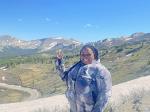Jenelle_Cockerham

Jenelle_Cockerham is a student at Fort Valley State University currently completing Her research at Colorado School of Mines under Dr. Kamini Singha.
In this project we are studying the activity of water in Crusted Butte, CO. The objective is to study the hydrologic events, understand and notice the changes in groundwater flow, stream discharge, bedrock weathering, and nutrient cycling throughout the year drive changes in meta(loid) concentrations in groundwater. The last goal is to understand physical and biogeochemical processes combine to shape meta(loid) fate and transport processes in streams.
Key Points
July 22nd, 2022
https://docs.google.com/document/d/1UPV1lOUQyMVEfszLwWvbYQSuhzUNWTnq_o6cRpYgEis/editPost at least one figure (other than your map) and caption that best represents your research at its current stage.
I chose one of my graphs and it shoes the the temperature plotted, the Electro conductivity, Sp and the amount of NaCl added in to the water. This is only one of many graphs because it was two tracer injections performed and we measurd the pressure, and graphs strictly focused on electroconductivity.
Select the paper that is most central to your work this summer. Summarize the key points of this paper and explain its relevance.
Paper: Sources of Metal Contamination In Coal Creek Watersed, Crusted Butte, Gunnison County, Colorado: Part 1: Low Flow, Septembet 2005 by Brianna SHanklin and Joseph N. Ryan
This article talks about the metal contamination in Coal Creek. It's basically the same thing; they are performing a lithium chloride tracer dilution test for the quantification of both surfaces in hyporheic flow. Some of the metals they are looking for are aluminum, arsenic, barium, cadmium, chromium, copper, iron, lead, manganese, nickel, and zinc. In my project, instead of using lithium chloride for the tracer dilution test we are using sodium chloride. In the article they talk about the field side, the injection procedure, the analytical methods, the flow rate, and the metals in Coal Creek.
Science Pitch
July 10th, 2022
Blogs –Reflect on the elevator speech assignment. What it hard or easy? Why did you feel this way? Where do you feel like your speech might be useful besides AGU? Where/why do you think this skill might be useful in the future? What was this feedback important?
Looking at the elevator speech assignment, it initially was moderate and sounded scripted. I feel like the hardest part is actually starting and thinking of where should I start. I feel like this would be useful in school and at a workplace maybe. Presenting, in general, is important, and learning the technique of staying interesting is something everyone should learn. Nevertheless, it is extremely challenging to convey the significance of our work in terms of positive effects on society and human health orally. Finding the importance of feedback is essential because you will know what to work on as you progress.
Dataset and skills
July 10th, 2022
First, describe the dataset that you will be working with this summer. For example, where was it collected? What are the strengths and weaknesses of the data set as you see them now? Is it a widely used data set or will you be one of the first people to look at it? Are you starting off your project with raw data that you will have to do the initial processing and event-picking from or are you starting a little further down the line?
Second, choose at least one of the skills from the mentoring rubric and reflect on it. What would it mean to demonstrate this skill proficiently? Why is the skill important to develop? What steps are you taking to further develop in this area?
So we are mainly looking at hydrology at coal creek. We went to Crusted Butte, Colorado. The questions we have to look at are 1. Do you think that tracers are affected by hydrology? If so, how? 2. How do you think the groundwater flow, stream discharge, bedrock weathering, and nutrient cycling throughout the year change in metalloid concentrations in groundwater and surface water? 3. How do physical and biogeochemical processes combine to shape metalloid fate and transport processes in streams? Some of the strengths in the data set were finding the electroconductivity to exactly understand what we were doing and looking at the activity of the water. Some weaknesses were using certain equations to find different forms of the pressure of the water. Therefore, using one equation such as absolute pressure minus atmospheric pressure. The data set is a lot to take in and widely used and I was not the first person to look at it. I don't believe this project was started with data, but from the given articles this isn't the first time this project has been conducted with tracer tests.
The skill I chose from the mentoring rubric was communication skills. I am usually shy when it comes to just about anything. I would like to be able to ask questions and have a bit more input. I think just stepping out of my comfort zone and being able to talk and ask questions when confused. Understanding the distinctions in communication styles for face-to-face contacts, phone calls, and digital communications like email and social media is also useful.


